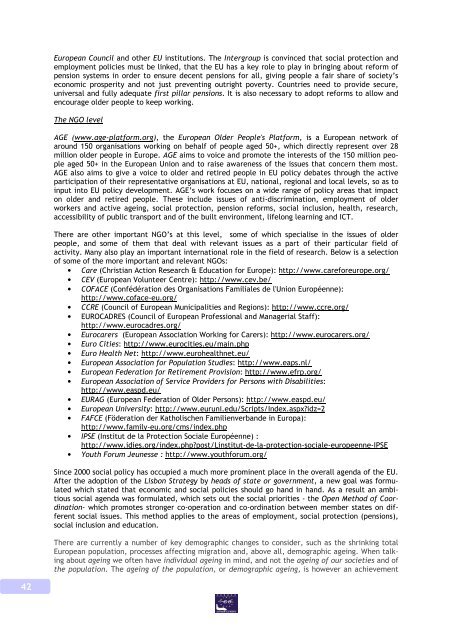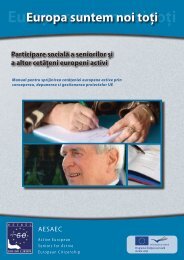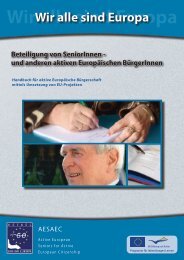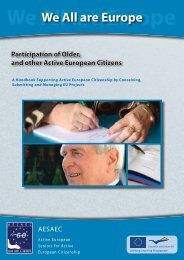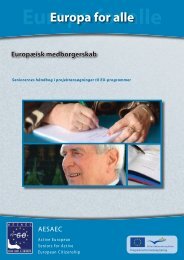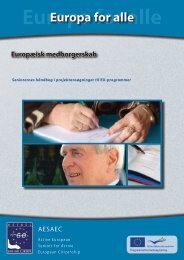We All are Europe - AESAEC
We All are Europe - AESAEC
We All are Europe - AESAEC
Create successful ePaper yourself
Turn your PDF publications into a flip-book with our unique Google optimized e-Paper software.
<strong>Europe</strong>an Council and other EU institutions. The Intergroup is convinced that social protection and<br />
employment policies must be linked, that the EU has a key role to play in bringing about reform of<br />
pension systems in order to ensure decent pensions for all, giving people a fair sh<strong>are</strong> of society’s<br />
economic prosperity and not just preventing outright poverty. Countries need to provide secure,<br />
universal and fully adequate first pillar pensions. It is also necessary to adopt reforms to allow and<br />
encourage older people to keep working.<br />
The NGO level<br />
AGE (www.age-platform.org), the <strong>Europe</strong>an Older People's Platform, is a <strong>Europe</strong>an network of<br />
around 150 organisations working on behalf of people aged 50+, which directly represent over 28<br />
million older people in <strong>Europe</strong>. AGE aims to voice and promote the interests of the 150 million people<br />
aged 50+ in the <strong>Europe</strong>an Union and to raise aw<strong>are</strong>ness of the issues that concern them most.<br />
AGE also aims to give a voice to older and retired people in EU policy debates through the active<br />
participation of their representative organisations at EU, national, regional and local levels, so as to<br />
input into EU policy development. AGE’s work focuses on a wide range of policy <strong>are</strong>as that impact<br />
on older and retired people. These include issues of anti-discrimination, employment of older<br />
workers and active ageing, social protection, pension reforms, social inclusion, health, research,<br />
accessibility of public transport and of the built environment, lifelong learning and ICT.<br />
There <strong>are</strong> other important NGO’s at this level, some of which specialise in the issues of older<br />
people, and some of them that deal with relevant issues as a part of their particular field of<br />
activity. Many also play an important international role in the field of research. Below is a selection<br />
of some of the more important and relevant NGOs:<br />
• C<strong>are</strong> (Christian Action Research & Education for <strong>Europe</strong>): http://www.c<strong>are</strong>foreurope.org/<br />
• CEV (<strong>Europe</strong>an Volunteer Centre): http://www.cev.be/<br />
• COFACE (Confédération des Organisations Familiales de l'Union Européenne):<br />
http://www.coface-eu.org/<br />
• CCRE (Council of <strong>Europe</strong>an Municipalities and Regions): http://www.ccre.org/<br />
• EUROCADRES (Council of <strong>Europe</strong>an Professional and Managerial Staff):<br />
http://www.eurocadres.org/<br />
• Euroc<strong>are</strong>rs (<strong>Europe</strong>an Association Working for C<strong>are</strong>rs): http://www.euroc<strong>are</strong>rs.org/<br />
• Euro Cities: http://www.eurocities.eu/main.php<br />
• Euro Health Net: http://www.eurohealthnet.eu/<br />
• <strong>Europe</strong>an Association for Population Studies: http://www.eaps.nl/<br />
• <strong>Europe</strong>an Federation for Retirement Provision: http://www.efrp.org/<br />
• <strong>Europe</strong>an Association of Service Providers for Persons with Disabilities:<br />
http://www.easpd.eu/<br />
• EURAG (<strong>Europe</strong>an Federation of Older Persons): http://www.easpd.eu/<br />
• <strong>Europe</strong>an University: http://www.euruni.edu/Scripts/Index.aspxidz=2<br />
• FAFCE (Föderation der Katholischen Familienverbande in Europa):<br />
http://www.family-eu.org/cms/index.php<br />
• IPSE (Institut de la Protection Sociale Européenne) :<br />
http://www.idies.org/index.phppost/Linstitut-de-la-protection-sociale-europeenne-IPSE<br />
• Youth Forum Jeunesse : http://www.youthforum.org/<br />
Since 2000 social policy has occupied a much more prominent place in the overall agenda of the EU.<br />
After the adoption of the Lisbon Strategy by heads of state or government, a new goal was formulated<br />
which stated that economic and social policies should go hand in hand. As a result an ambitious<br />
social agenda was formulated, which sets out the social priorities - the Open Method of Coordination-<br />
which promotes stronger co-operation and co-ordination between member states on different<br />
social issues. This method applies to the <strong>are</strong>as of employment, social protection (pensions),<br />
social inclusion and education.<br />
There <strong>are</strong> currently a number of key demographic changes to consider, such as the shrinking total<br />
<strong>Europe</strong>an population, processes affecting migration and, above all, demographic ageing. When talking<br />
about ageing we often have individual ageing in mind, and not the ageing of our societies and of<br />
the population. The ageing of the population, or demographic ageing, is however an achievement<br />
42


